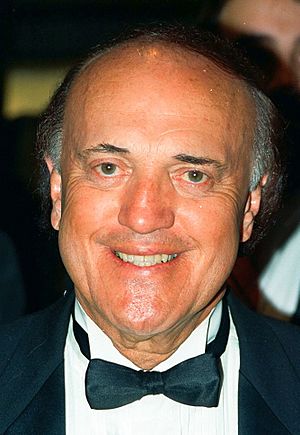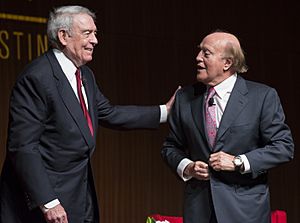Peter Arnett facts for kids
Quick facts for kids
Peter Arnett
|
|
|---|---|

Arnett in 1996
|
|
| Born |
Peter Gregg Arnett
13 November 1934 Riverton, New Zealand
|
| Died | 17 December 2025 (aged 91) Newport Beach, California, U.S.
|
| Occupation | Journalist, anchorman |
| Years active | 1960–2007 |
|
Notable credit(s)
|
Awarded the 1966 Pulitzer Prize in International Reporting for his work in Vietnam |
| Spouse(s) | Nina Nguyen (separated 1983) |
| Children | 2 |
Peter Gregg Arnett (born November 13, 1934, died December 17, 2025) was a famous journalist. He was born in New Zealand but also became an American citizen. He was well-known for reporting from war zones, especially the Vietnam War and the Gulf War. For his brave work in Vietnam, he won the important Pulitzer Prize in 1966. He reported for the Associated Press during those years.
Arnett came from a Māori and English family in New Zealand. He started his journalism career there. Later, he worked for many news groups, including CNN for almost 20 years. His reports from Baghdad, Iraq during the 1991 Gulf War were especially famous. He also wrote a book about his experiences. In 1997, he interviewed Osama bin Laden, a leader of a group called Al-Qaeda. A journalism school in New Zealand was even named after him.
Contents
Early Life and Beginnings
Peter Arnett was born in 1934 in Riverton, New Zealand, a town in New Zealand. He had both Māori (from the Ngāi Tahu tribe) and English family roots. His very first job as a journalist was at a newspaper called The Southland Times.
Reporting from Vietnam
Before Vietnam, Peter Arnett worked in Southeast Asia, including Bangkok and Laos. In 1960, he even started a small English newspaper in Laos. He then moved to Vietnam, where the United States was becoming involved in a big conflict.
Arnett became a reporter for the Associated Press in Saigon. He reported on the Vietnam War as it unfolded. In 1963, he was hurt during a clash between journalists and local police while covering protests. His reports, like one about a battle in 1965, sometimes made the American government unhappy. They wanted more positive news about the war.
He went on many missions with soldiers, including a tough battle in 1967. In 1972, he traveled to Hanoi in North Vietnam with peace activists. Their goal was to bring back American prisoners of war.
Arnett wrote honestly about the experiences of soldiers and everyday people. This style of reporting was sometimes criticized by leaders who preferred a different view of the war. Important figures like President Lyndon B. Johnson tried to get him removed from Vietnam.
One of his most famous reports was from 1968, during the Battle of Bến Tre. He quoted a U.S. major saying, "It became necessary to destroy the town to save it." This quote became very well-known. It showed the difficult choices made during the war. Arnett was one of the last Western reporters to stay in Saigon when the war ended. He later helped create a documentary series called Vietnam: The Ten Thousand Day War.
Reporting on the Soviet-Afghan War
During the Soviet Invasion of Afghanistan, Arnett worked for Parade magazine. He bravely entered Afghanistan from Pakistan, dressed in local clothes, with guides. He met with a group of local fighters. His trip ended when his companion's cameras were damaged. He later shared his story with another journalist who was covering the war from the Soviet side.
Live from the Gulf War
From 1981 to 1999, Peter Arnett worked for CNN. He became very famous during the Gulf War in 1991. He was the only reporter broadcasting live from Baghdad, Iraq, especially during the first 16 hours of the conflict. His reports were dramatic, often with air raid sirens and bombs heard in the background.
With two other CNN journalists, Bernard Shaw and John Holliman, Arnett provided constant updates. They were called the "Boys of Baghdad." CNN had a special phone line that allowed them to report to the world. When other journalists left, Arnett stayed on as the only reporter.
His reports about damage to civilian areas were not popular with the military leaders. They wanted to show that bombs were very accurate and caused little harm to civilians. Some people criticized Arnett, saying his reports might be influenced by the Iraqi government.
During the war, Arnett got an exclusive interview with Saddam Hussein, the leader of Iraq. Because of Arnett's unique reporting, the Gulf War was the first war to be shown live on TV for many weeks.
At one point, the CIA had concerns about the hotel where Arnett was staying. They thought the Iraqi military might be using it for communications. The CIA wanted Arnett to leave so the hotel could be targeted. However, Arnett refused, saying he had seen no such facility.
Interviewing Osama Bin Laden
In March 1997, Peter Arnett interviewed Osama bin Laden for CNN. Bin Laden was the leader of a group called Al-Qaeda. Arnett asked him about his future plans. Bin Laden replied that people would "see them and hear about them in the media." This was a very important interview at the time.
The "Operation Tailwind" Report
In 1998, Arnett narrated a report for CNN and Time magazine. It was about a military action called "Operation Tailwind" from 1970. The report suggested that the United States Army might have used a special chemical during this operation.
However, the report caused a lot of debate. The Pentagon, a U.S. government department, created its own report that disagreed with CNN's findings. CNN then investigated its own story. They found that their report had mistakes and was "flawed." CNN officially took back the story. It was confirmed that no chemical weapons were used in Operation Tailwind.
Because of this, some people involved in the report lost their jobs. Arnett was also disciplined and left CNN in 1999.
Reporting on the 2003 Iraq Invasion
In 2003, Arnett went to Iraq for NBC and National Geographic to cover the U.S. invasion. He gave an interview to Iraqi TV, where he shared his thoughts on the war. He mentioned that America was rethinking its plans because of Iraqi resistance.
His comments caused a lot of discussion. NBC and National Geographic ended their working relationship with Arnett. They stated it was wrong for him to give an interview to state-controlled Iraqi TV and share his personal opinions during wartime. Arnett admitted it was a "stupid misjudgment" to give the impromptu interview. Soon after, he found new work with other news organizations.
Academic Career

After retiring as a field reporter in 2007, Arnett lived in Los Angeles.
He also taught journalism at Shantou University in China. In New Zealand, a journalism school at the Southern Institute of Technology was named the Peter Arnett School of Journalism, but it closed in 2015.
Personal Life
In 1964, Arnett married Nina Nguyen, a Vietnamese woman. They had two children, Elsa and Andrew. Nina and Peter separated in 1983 and divorced later, but they reconciled in 2006.
His daughter, Elsa Arnett, also became a journalist. She worked for The Washington Post and The Boston Globe. She helped her father write his 1994 book about his reporting life. Elsa Arnett is married to John Yoo, a former White House lawyer.
In 2007, Arnett was recognized for his services to journalism. He was appointed an Officer of the New Zealand Order of Merit.
Peter Arnett passed away from prostate cancer in Newport Beach, California, on December 17, 2025. He was 91 years old.
Selected Works
- Live from the Battlefield: From Vietnam to Baghdad: 35 Years in the World's War Zones. New York: Simon & Schuster, 1994. ISBN: 978-0-671-75586-7
- Saigon Has Fallen: A Wartime Recollection by the Pulitzer Prize-Winning Journalist. New York: Rosetta Books/Associated Press, 2015 ISBN: 978-0-7953-4643-9
See also
 In Spanish: Peter Arnett para niños
In Spanish: Peter Arnett para niños
- List of New Zealand television personalities
 | Dorothy Vaughan |
 | Charles Henry Turner |
 | Hildrus Poindexter |
 | Henry Cecil McBay |

